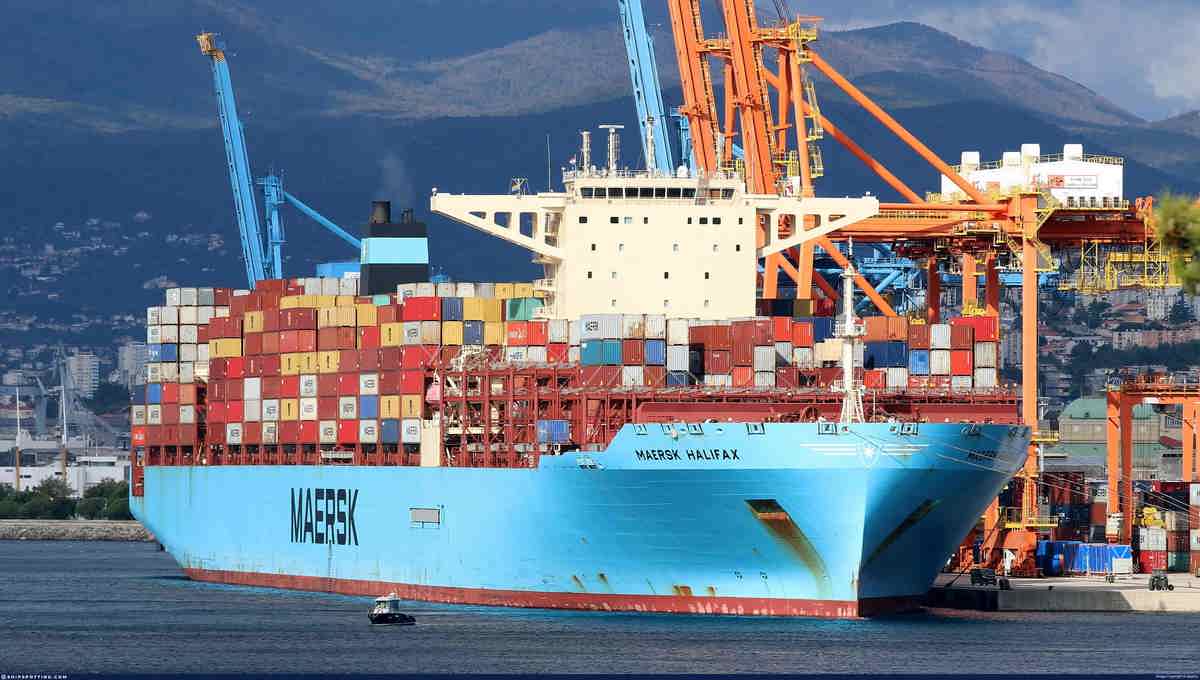Maersk will invest in LNG-capable ships to run on biomethane
Maersk plans to place orders and sign charter contracts for 50–60 new dual-fuel vessels, which will include LNG- and methanol-capable ships.
 PHOTO: Maersk's container ship, Maersk Halifax. A.P. Moller-Maersk
PHOTO: Maersk's container ship, Maersk Halifax. A.P. Moller-Maersk
Danish shipping major A.P. Moller-Maersk has not specified the exact division between LNG vessels and the methanol vessels it will order or charter. But it has clarified that the “exact split of propulsion technologies will be determined considering the future regulatory framework and green fuels supply.”
The company aims for a total capacity of 800,000 TEU across all the orders. Vessels with a capacity of around 300,000 TEU will be owned by the company, while the remaining vessels, accounting for 500,000 TEU capacity, will be secured through time-charter agreements, it said.
Maersk currently has five methanol-capable vessels in operation and another 20 on order for delivery towards 2027.
This is the first time it has ordered LNG-capable vessels.
In 2020, Maersk mentioned in its Sustainability Report that it would not use transitional marine fuels such as LNG but instead "leapfrog" to net zero fuels. This decision was backed by its internal research, which placed methanol and ammonia as the top priorities in the future marine fuel mix.
In addition, the company’s former chief executive, Søren Skou, said during the company’s investor presentation in 2020, “We don’t believe that LNG will play a significant role for us as a transition fuel because it is still a fossil fuel, and we would rather transition directly from our current practices to neutral fuel types.”
However, the Danish major has now justified its investment in LNG-capable vessels by noting that these ships can also run on liquefied biomethane (LBM), which is seen as a cleaner alternative to fossil LNG.
“To ensure the long-term competitiveness of the fleet and its ability to deliver on the decarbonisation goals, Maersk has elected a mix of methanol and liquified gas dual-fuel propulsion systems. While green methanol is likely to become the most competitive and scalable pathway to decarbonisation in the short term, Maersk also foresees a multifuel future for the industry, which includes liquified bio-methane,” it argued.
LBM is biogas that has been upgraded to remove CO2 and then liquefied to be used as fuel. LBM can function as a drop-in fuel in LNG, similar to the way biofuels can be blended with MGO or VLSFO. This means that vessels capable of running on LNG will not need modifications to run on pure LBM or LBM-LNG blends.
Since LBM does not have a fossil origin, it emits significantly less greenhouse gas (GHG) than fossil LNG on a well-to-wake (WtW) basis. LBM has a WtW emissions intensity of 20.24 grams of CO2-equivalent per megajoule (20.24 gCO2e/MJ), which is much lower than VLSFO (92.63 gCO2e/MJ) and fossil LNG (77.43 gCO2e/MJ), according to Transport & Environment's calculations based on FuelEU Maritime Annex II and the Renewable Energy Directive II.
There is, however, a risk that the ship's engine can emit stray methane during LBM combustion. Stray methane refers to methane that escapes into the atmosphere unintentionally. The global warming potential of methane derived from biological origin is 80.6 times greater than CO2 over a 20-year period, according to the International Council on Clean Transportation.
Maersk has stated that it has already started working on securing LBM offtake agreements to “ensure that the new dual-fuel gas vessels provide greenhouse gas emissions reductions in this decade.”
Climate advocates lash out
The company’s decision has drawn criticism from shipping-focused climate advocates.
Last month, the global shipping campaign Say No to LNG urged Maersk to adhere to its previous commitments and halt all investments in LNG.
Say No To LNG coalition includes climate advocates such as Transport & Environment, Opportunity Green, and Clean Arctic Alliance. It argued that the investment in LNG-capable vessels “directly contradicts” Maersk’s earlier pledges to prioritise zero-emission fuels.
By Konica Bhatt
Please get in touch with comments or additional info to news@engine.online






